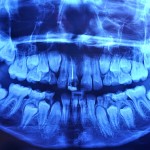
Between 1-3% of the population have impacted upper canines. For the majority (85%) these are displaced palatally. This may result in loss of space, displacement, root resorption of adjacent teeth and cyst formation and surgical exposure followed by extensive orthodontic treatment. Interceptive treatment involving the early removal of the primary canine has been reported to facilitate eruption of the permanent canine in a number of studies. Although a 2012 Cochrane review (Dental Elf -14th Dec 2012) reported that there was no reliable evidence.
The aim of this review was to determine whether the successful management of palatally displaced permanent canines (PDCs) can be achieved by the interceptive extraction of primary maxillary canines.
Methods
Searches were conducted in the Medline (PubMed), Scopus, Web of Science, and the Cochrane Collaboration Oral Health Group trials register databases. Randomised controlled trials(RCTs) or cohort studies that evaluated eruption of PDCs after interceptive extraction of primary canines were considered. Two reviewers selected studies and assessed study quality using a points based system adapted from the CONSORT statement and Jadad scale.
Results
- 4 RCTs were included involving a total of 206 children.
- The intervention groups in the selected studies had a significantly higher incidence of successful eruption of PDCs (ranging from 50% to 69%) compared with the control groups (36%–42%).
Conclusions
The authors concluded: –
Based on the available evidence, it is reasonable to conclude that eruption of PDCs can be facilitated by extraction of primary canines. However, further high-quality, randomized clinical trials are warranted in other population groups. It is hoped that this study will help orthodontists make evidence-based decisions about clinically managing PDCs
Comments
While this review has a single author it would appear from the methodology that two reviewers were involved in the selection, abstraction and quality assessment of the studies. The Cochrane Oral Health Group last updated their review of this topic in 2012 (Dental Elf -14th Dec 2012). This new review updates the available evidence by including two new RCTs published since the Cochrane review update (Naoumova 2014 and Bazargani et al 2014). While both of these RCTs are of higher quality than the earlier studies in included in the Cochrane review they are both relatively small in size involving an additional 91 children in total and not without bias. As both new studies are RCTs it would have been helpful if the authors had used the Cochrane risk of bias tool to assess study quality. While the availability of the two new studies does provide some additional evidence, more evidence is needed from well conducted and reported high-quality RCTs.
Links
Primary paper
Almasoud NN. Extraction of primary canines for interceptive orthodontic treatment of palatally displaced permanent canines: A systematic review. Angle Orthod. 2017 Aug 11. doi: 10.2319/021417-105.1. [Epub ahead of print] PubMed PMID: 28800259.
Other references
Dental Elf – 14th Dec 2014
Naoumova J. Interceptive Treatment Of Palatally Displaced Canines. Swed Dent J Suppl. 2014;(234):7-118. PubMed PMID: 26688983.
Bazargani F, Magnuson A, Lennartsson B. Effect of interceptive extraction of deciduous canine on palatally displaced maxillary canine: a prospective randomized controlled study. Angle Orthod. 2014 Jan;84(1):3-10. doi: 10.2319/031013-205.1. Epub 2013 Jun 18. PubMed PMID: 23777411.
